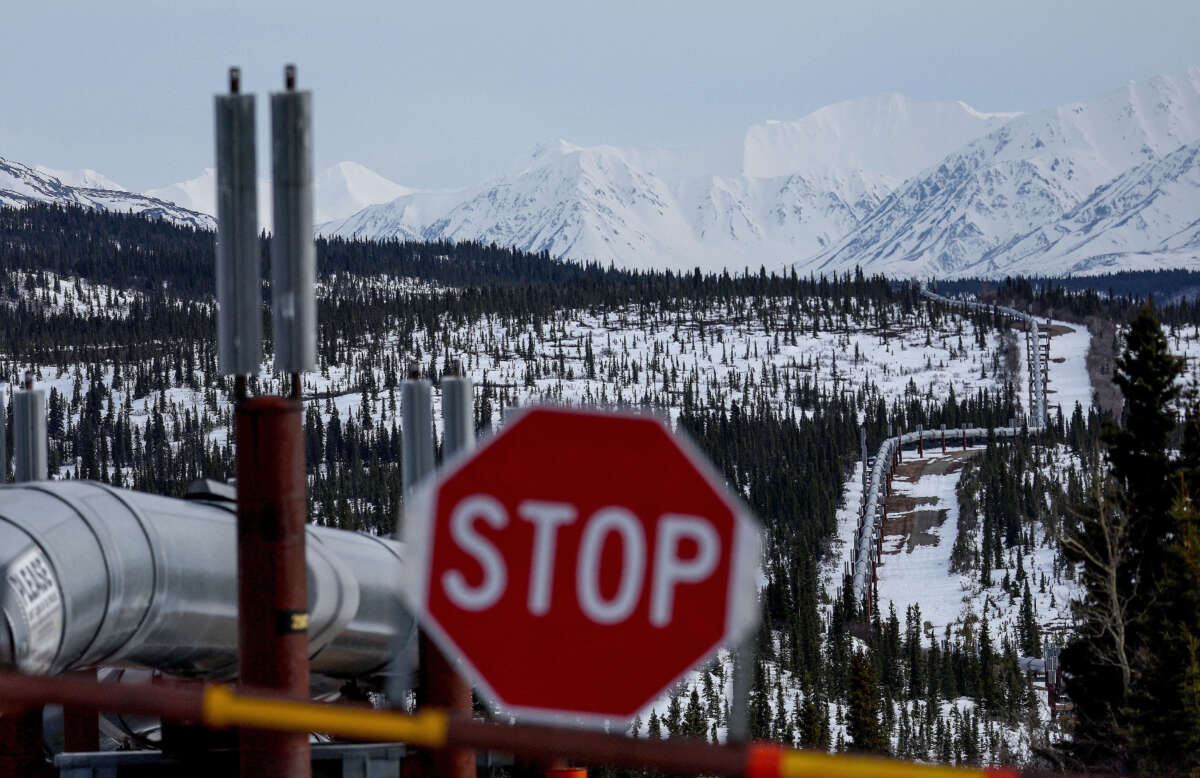The Willow Project, dubbed a “carbon bomb,” is being challenged by climate advocates in court.
By Sharon Zhang ,
January 9, 2024

A part of the Trans Alaska Pipeline System runs through boreal forest past Alaska Range mountains on May 5, 2023, near Delta Junction, Alaska.
MARIO TAMA / GETTY IMAGES
A group of Democrats in the House and the Senate is throwing its weight behind climate and Indigenous groups’ lawsuit seeking to stop a massive project in Alaska approved by the Biden administration last year that would bring fossil fuel development to pristine land in Alaska’s North Slope, deemed a “carbon bomb” by climate advocates.
Led by Rep. Jared Huffman (D-California), the lawmakers filed an amicus brief with the Ninth Circuit Court of Appeals calling on judges to overturn a district court’s November decision to allow the project to proceed, saying that the project “violates the nation’s laws” as well as congressional intent. A total of 16 lawmakers joined the brief, including prominent members like Rep. Alexandria Ocasio-Cortez (D-New York) and Senators Ed Markey (D-Massachusetts) and Bernie Sanders (I-Vermont).
In the brief, lawmakers argued that the project would not serve the interests of all Americans and thus violates protections for federal land, and that federal regulators are ignoring climate considerations set forth by their own administration by advancing the project.
“Due to national security and environmental considerations, modern-day United States policy embodies a pressing need to reduce national reliance on non-renewable energy sources — policy that is undermined by the Willow Project,” the lawmakers wrote.
They went on to say that Willow is not consistent with the intent behind climate regulations and laws; specifically, for the latter, the lower court had misinterpreted the Naval Petroleum Reserves Production Act (NPRPA) and sidelined the National Environmental Protection Act (NEPA), they said.
A group of Democrats in the House and the Senate is throwing its weight behind climate and Indigenous groups’ lawsuit seeking to stop a massive project in Alaska approved by the Biden administration last year that would bring fossil fuel development to pristine land in Alaska’s North Slope, deemed a “carbon bomb” by climate advocates.
Led by Rep. Jared Huffman (D-California), the lawmakers filed an amicus brief with the Ninth Circuit Court of Appeals calling on judges to overturn a district court’s November decision to allow the project to proceed, saying that the project “violates the nation’s laws” as well as congressional intent. A total of 16 lawmakers joined the brief, including prominent members like Rep. Alexandria Ocasio-Cortez (D-New York) and Senators Ed Markey (D-Massachusetts) and Bernie Sanders (I-Vermont).
In the brief, lawmakers argued that the project would not serve the interests of all Americans and thus violates protections for federal land, and that federal regulators are ignoring climate considerations set forth by their own administration by advancing the project.
“Due to national security and environmental considerations, modern-day United States policy embodies a pressing need to reduce national reliance on non-renewable energy sources — policy that is undermined by the Willow Project,” the lawmakers wrote.
They went on to say that Willow is not consistent with the intent behind climate regulations and laws; specifically, for the latter, the lower court had misinterpreted the Naval Petroleum Reserves Production Act (NPRPA) and sidelined the National Environmental Protection Act (NEPA), they said.
“Another Massive Climate Disappointment”: Biden Slammed for Oil Project Approval
The Willow project, as proposed by ConocoPhillips, has been dubbed a “carbon bomb” by climate advocates.
By Sharon Zhang , TRUTHOUTMarch 13, 2023
While the district judge had cited a provision in NPRPA that directs regulators to “conduct an expeditious program” of oil and gas leasing in the National Petroleum Reserve in Alaska, the lawmakers say that the judge ignored other environmental protection provisions in the law, including a mandate to “mitigate … adverse effects” on the region’s resources to “assure the maximum protection” of certain protected areas.
“Congress historically afforded special consideration to the Naval Petroleum Reserve-Alaska — highlighting it as a resource not only due to its oil potential, but for its abundant natural diversity,” the brief reads. “The environmental protection provisions in the NPRPA are important, intentional inclusions of Congress.”
The lower court judge was “Fatally deterministic in deference to the perceived ‘expeditious’ objectives of the NPRPA” in her decision, the brief goes on, to the point where she swept aside proper environmental analyses required by NEPA in order to allow the project to move forward. “It bears stating plainly: any congressional intent relevant to the ‘expeditious’ clause in NPRPA does not supersede the congressional intent of the nation’s bedrock environmental statutes and considerations,” the lawmakers wrote.
ConocoPhillips’s Willow Project is slated to be constructed in a majority-Native American area in Alaska, in a reserve that currently holds the title of being the U.S.’s single largest piece of pristine land. Climate advocates call the project a “carbon bomb” for its predicted impact of releasing nearly 260 million metric tons of carbon emissions, or a third of yearly emissions from U.S. coal plants, further worsening the climate crisis.
The case is a combination of lawsuits brought by Earthjustice on behalf of a coalition of climate groups and a suit brought by Trustees for Alaska, representing the Sovereign Iñupiat for a Living Arctic and other groups. The lawsuits were filed after the Biden administration gave the Willow Project, long opposed by Indigenous and climate groups, the greenlight last March despite his promise not to back new drilling on federal lands on the campaign trail.
The Willow project, as proposed by ConocoPhillips, has been dubbed a “carbon bomb” by climate advocates.
By Sharon Zhang , TRUTHOUTMarch 13, 2023
While the district judge had cited a provision in NPRPA that directs regulators to “conduct an expeditious program” of oil and gas leasing in the National Petroleum Reserve in Alaska, the lawmakers say that the judge ignored other environmental protection provisions in the law, including a mandate to “mitigate … adverse effects” on the region’s resources to “assure the maximum protection” of certain protected areas.
“Congress historically afforded special consideration to the Naval Petroleum Reserve-Alaska — highlighting it as a resource not only due to its oil potential, but for its abundant natural diversity,” the brief reads. “The environmental protection provisions in the NPRPA are important, intentional inclusions of Congress.”
The lower court judge was “Fatally deterministic in deference to the perceived ‘expeditious’ objectives of the NPRPA” in her decision, the brief goes on, to the point where she swept aside proper environmental analyses required by NEPA in order to allow the project to move forward. “It bears stating plainly: any congressional intent relevant to the ‘expeditious’ clause in NPRPA does not supersede the congressional intent of the nation’s bedrock environmental statutes and considerations,” the lawmakers wrote.
ConocoPhillips’s Willow Project is slated to be constructed in a majority-Native American area in Alaska, in a reserve that currently holds the title of being the U.S.’s single largest piece of pristine land. Climate advocates call the project a “carbon bomb” for its predicted impact of releasing nearly 260 million metric tons of carbon emissions, or a third of yearly emissions from U.S. coal plants, further worsening the climate crisis.
The case is a combination of lawsuits brought by Earthjustice on behalf of a coalition of climate groups and a suit brought by Trustees for Alaska, representing the Sovereign Iñupiat for a Living Arctic and other groups. The lawsuits were filed after the Biden administration gave the Willow Project, long opposed by Indigenous and climate groups, the greenlight last March despite his promise not to back new drilling on federal lands on the campaign trail.
This article is licensed under Creative Commons (CC BY-NC-ND 4.0), and you are free to share and republish under the terms of the license.

SHARON ZHANG is a news writer at Truthout covering politics, climate and labor. Before coming to Truthout, Sharon had written stories for Pacific Standard, The New Republic, and more. She has a master’s degree in environmental studies. She can be found on Twitter: @zhang_sharon.

No comments:
Post a Comment